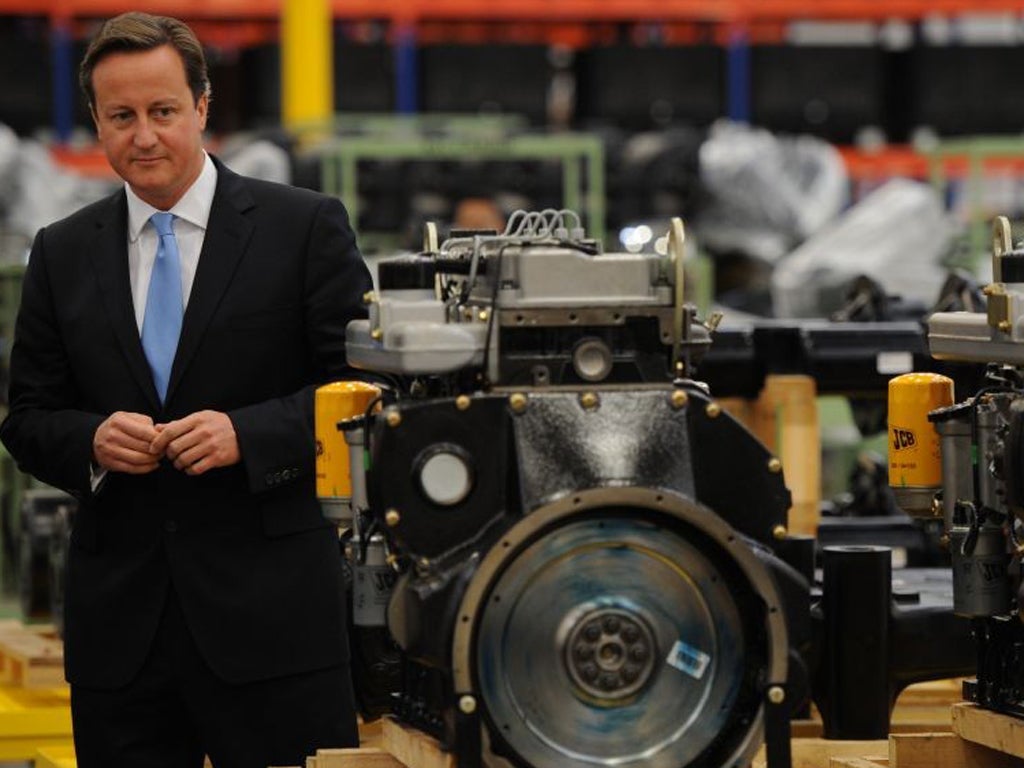Cameron celebrates £100m trade deals with Brazil

Prime Minister David Cameron today celebrated UK companies winning trade deals worth more than £100 million with Brazil, as he led a delegation of more than 50 British businesses to the South American country.
Among the deals is a contract for London-based Bluecube to provide seating for the Fortaleza stadium for the upcoming World Cup in Brazil.
Mr Cameron was offered a coveted invitation to the opening game of the 2014 tournament by the Governor of Sao Paulo, as he opened a £60 million JCB factory near the city.
The 350,000 square foot assembly plant for excavators and diggers is expected to generate £100 million a year in orders for the company's components plants in Staffordshire, Derbyshire and Wales.
In an interview with Sao Paulo newspaper Folha, Mr Cameron admitted that Britain had been “under-performing” in its trade relationship with Brazil, now the world's sixth biggest economy.
The UK accounts for 1.5 per cent of imports to Brazil, compared to 6.4 per cent from Germany.
The 58-strong business delegation was the largest to accompany the PM on his series of trade missions to the emerging economic giants of the 21st century.
Since his election in 2010, Mr Cameron has made boosting exports a key foreign policy priority.
Brazil is the last of the four BRIC economies he has visited, after Russia, India and China, and he has now been to all of the G20 countries with the exception of Argentina.
Among the PM's party were representatives of the energy, finance, utility and higher education sectors as well as defence companies, including BAE Systems, as the UK continues to seek arms deals with Brazil despite its support for Argentina over the Falklands.
Making his visit to the JCB plant in Sorocaba, near Sao Paulo, Mr Cameron said: “This visit is about British jobs, British growth and the British economy, because I want Britain to be tied up to the fastest-growing economies on the planet.
”Brazil is now a top six economy and this visit is about safeguarding and creating 3,000 jobs back at home.“
JCB recently won a Brazilian government tender for £60 million for 1,000 backhoe loaders for road construction and hopes to secure some of the upcoming £20 billion infrastructure projects in Brazil.
Deals announced today included a £6 million BP research project in collaboration with Aberdeen, Cambridge and Oxford universities to examine potential oil and gas sources in the Parnaiba Basin in north-east Brazil.
GE Energy announced a £75 million deal to supply electricity and rig equipment, safeguarding up to 1,500 jobs in the UK, including at its Rugby plant.
EM&I and Odebrecht Oil and Gas announced a partnership to deliver contracts worth over £20 million, creating jobs in the UK and Brazil.
Design and engineering firm Arup confirmed it expected its projects in Brazil to increase from 38 to 300 over the next three years.
Wales-based General Dynamics UK is opening a new subsidiary to deliver capability to the Brazilian defence and security sectors.
And Natures Purest, of Leicestershire, is set to open its third baby product store in Rio de Janeiro as part of a 10-store plan expected to generate an extra £1.2 million in turnover.
Useful Simple Brazil will open an office in Rio expected to create annual revenue of £1.5 million and create 15 jobs in London.
Mr Cameron announced a new £13 million fund to help 10,000 of the UK's smaller businesses boost exports.
And he said that the Government would host an Export Week from November 12 to 16, offering advice and expertise for companies hoping to sell their products overseas.
Speaking to Folha de Sao Paulo newspaper, Mr Cameron acknowledged that Britain's recovery from recession was proving "slow and difficult", and that boosting trade to growing markets such as Brazil was part of the solution.
"Britain has been dealing with some very deep-rooted problems at home and a very serious debt crisis abroad, and that is why getting our economy growing is proving to be a slow and difficult process," said the Prime Minister.
"I'm confident that, as the governor of the Bank of England has said, the fall in unemployment figures shows that the economy is slowly healing, with many of the conditions for recovery in place."
Mr Cameron said he will urge President Dilma Rousseff to support free trade in their talks tomorrow and resist calls for protectionist policies.
"I'm a firm believer that boosting trade is essential to getting the motors of the world economy moving again," said Mr Cameron.
"We shouldn't prolong the current economic downturn by retreating at home and putting up protectionist barriers. Instead, we need to break down these barriers to stimulate jobs, growth and prosperity across the world.
"Long-term investment decisions are extremely complex. Companies need clarity, confidence and certainty that their investment decisions are soundly based.
"Trying to insulate and protect industry from competition may bring short-term benefits to domestic industry, but has long-term costs and prevent the development of a truly competitive, innovative industrial base. That will be my message to President Dilma."
The eurozone crisis gives Britain a chance to reshape its membership of the EU in favour of free trade, said Mr Cameron.
"Europe is changing rapidly and fundamentally," he told Folha.
"And as Europe changes to meet the challenges of the eurozone crisis, those countries that share the euro will have to do more to integrate, and that will give others, like Britain, opportunities to pursue their own agendas.
"We should use that opportunity to reshape Britain's membership of the EU in ways that advance our national interest in free trade, open markets and co-operation. I think that means less Europe not more Europe, less cost, less bureaucracy and less regulation."
PA
Join our commenting forum
Join thought-provoking conversations, follow other Independent readers and see their replies
Comments
Bookmark popover
Removed from bookmarks